 The Tullahoma campaign was practically closed by the disappearance of the enemy from the country north of the Tennessee River. Middle Tennessee was once more in the possession of the National troops, and
The Tullahoma campaign was practically closed by the disappearance of the enemy from the country north of the Tennessee River. Middle Tennessee was once more in the possession of the National troops, and 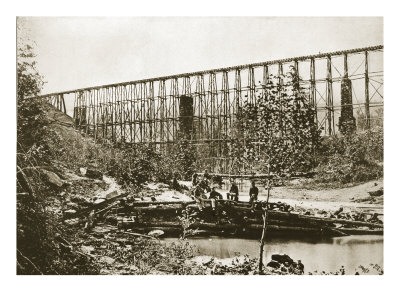 Rosecrans though strongly urged from Washington to continue on, resisted the pressure until he could repair the Nashville and Chattanooga railroad, which was of vital importance in supplying his army from its
Rosecrans though strongly urged from Washington to continue on, resisted the pressure until he could repair the Nashville and Chattanooga railroad, which was of vital importance in supplying his army from its  secondary base at Nashville. As he desired to hold this road to where it crossed the Tennessee, it was necessary to push a force beyond the mountains, and after a few days of rest at Cowan my division was
secondary base at Nashville. As he desired to hold this road to where it crossed the Tennessee, it was necessary to push a force beyond the mountains, and after a few days of rest at Cowan my division was  ordered to take station at After getting to the south side of the Tennessee River I was ordered to Valley Head, where McCook's corps was to concentrate.
ordered to take station at After getting to the south side of the Tennessee River I was ordered to Valley Head, where McCook's corps was to concentrate. On the 4th of September I ascended Sand Mountain, but had got only half way across the plateau, on top, when night came, the march having been a most toilsome one.
On the 4th of September I ascended Sand Mountain, but had got only half way across the plateau, on top, when night came, the march having been a most toilsome one.  The next day we descended to the base, and encamped near Trenton. On the 10th I arrived at Valley Head, and climbing Lookout Mountain
The next day we descended to the base, and encamped near Trenton. On the 10th I arrived at Valley Head, and climbing Lookout Mountain , encamped on the plateau at Indian Falls. The following day I went down into Broomtown Valley
, encamped on the plateau at Indian Falls. The following day I went down into Broomtown Valley to Alpine.
to Alpine. 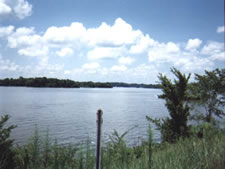 The march of McCook's corps from Valley Head to Alpine was in pursuance of orders directing it to advance on Summerville, the possession of which place would further threaten the enemy's communications, it being assumed that Bragg was in full retreat south, as he had abandoned Chattanooga on the 8th (soldier is fixed bayonet ltd cavalry, change the head
The march of McCook's corps from Valley Head to Alpine was in pursuance of orders directing it to advance on Summerville, the possession of which place would further threaten the enemy's communications, it being assumed that Bragg was in full retreat south, as he had abandoned Chattanooga on the 8th (soldier is fixed bayonet ltd cavalry, change the head  on this and youve got union or rebel soldiers. available from us.)
on this and youve got union or rebel soldiers. available from us.) . This assumption soon proved erroneous, however, and as we, while in Broomtown Valley, could not communicate directly with Thomas's corps, the scattered condition of the army began to alarm us all, and McCook abandoned the advance to Summerville, ordering back to the summit of Lookout Mountain such of the corps trains as had got down into Broomtown Valley.
. This assumption soon proved erroneous, however, and as we, while in Broomtown Valley, could not communicate directly with Thomas's corps, the scattered condition of the army began to alarm us all, and McCook abandoned the advance to Summerville, ordering back to the summit of Lookout Mountain such of the corps trains as had got down into Broomtown Valley.But before this I had grown uneasy in regard to the disjointed situation of our army, and, to inform myself of what was going on, determined to send a spy into the enemy's lines. In passing Valley Head on the 10th my scout Card,
 who had been on the lookout for some one capable to undertake the task, brought me a Union man with whom he was acquainted, who lived on Sand Mountain,
who had been on the lookout for some one capable to undertake the task, brought me a Union man with whom he was acquainted, who lived on Sand Mountain, and had been much persecuted by guerrillas on account of his loyal sentiments. He knew the country well, and as his loyalty was vouched for I asked him to go into the enemy's camp, which I believed to be near Lafayette,
and had been much persecuted by guerrillas on account of his loyal sentiments. He knew the country well, and as his loyalty was vouched for I asked him to go into the enemy's camp, which I believed to be near Lafayette, and, bring me such information as he could gather. He said such a journey would be at the risk of his life, and that at best he could not expect to remain in that section of country if he undertook it, but that he would run all the chances if I would enable him to emigrate to the West at the end c f the "job," which I could do by
and, bring me such information as he could gather. He said such a journey would be at the risk of his life, and that at best he could not expect to remain in that section of country if he undertook it, but that he would run all the chances if I would enable him to emigrate to the West at the end c f the "job," which I could do by  purchasing the small "bunch" of stock he owned on the mountain. To this I readily assented, and he started on the delicate undertaking. He penetrated the enemy's lines with little difficulty, but while prosecuting his search for information was suspected, and at once arrested and placed under guard. From this critical situation he escaped; however, making his way through the enemy's picket-line in the darkness by crawling on his belly and deceiving the sentinels by imitating the grunts of the half-wild, sand-colored hogs with which the country abounded. He succeeded in reaching Rosecrans's headquarters finally, and there gave the definite information that Bragg intended to fight, and that he expected to be reinforced by Longstreet.
purchasing the small "bunch" of stock he owned on the mountain. To this I readily assented, and he started on the delicate undertaking. He penetrated the enemy's lines with little difficulty, but while prosecuting his search for information was suspected, and at once arrested and placed under guard. From this critical situation he escaped; however, making his way through the enemy's picket-line in the darkness by crawling on his belly and deceiving the sentinels by imitating the grunts of the half-wild, sand-colored hogs with which the country abounded. He succeeded in reaching Rosecrans's headquarters finally, and there gave the definite information that Bragg intended to fight, and that he expected to be reinforced by Longstreet.
By this time it was clear that Bragg had abandoned Chattanooga with the sole design of striking us in detail as we followed in pursuit; and to prevent his achieving this purpose orders came at 12 o'clock, midnight, for McCook to draw in toward Chattanooga.
 This could be done only by recrossing Lookout Mountain, the enemy's army at Lafayette now interposing between us and Thomas's corps. The retrograde march began at once. I moved back over the mountain on the 13th and 14th to Stevens's Mills, and on the 15th and 16th recrossed through Stevens's Gap, in the Lookout range,
This could be done only by recrossing Lookout Mountain, the enemy's army at Lafayette now interposing between us and Thomas's corps. The retrograde march began at once. I moved back over the mountain on the 13th and 14th to Stevens's Mills, and on the 15th and 16th recrossed through Stevens's Gap, in the Lookout range,  and encamped at its base in McLamore's cove. The march was made with all possible celerity, for the situation was critical and demanded every exertion. The ascent and descent of the mountains was extremely exhausting, the steep grades often rendering it necessary to drag up and let down by hand both the transportation and artillery. But at last we were in conjunction with the main army, and my division breathed easier.
and encamped at its base in McLamore's cove. The march was made with all possible celerity, for the situation was critical and demanded every exertion. The ascent and descent of the mountains was extremely exhausting, the steep grades often rendering it necessary to drag up and let down by hand both the transportation and artillery. But at last we were in conjunction with the main army, and my division breathed easier.
On the 17th I remained in line of battle all day and night in front of McLamore's cove, the enemy making slight demonstrations against me from the direction of Lafayette.
 The main body of the army having bodily moved to the left meanwhile, I followed it on the 18th, encamping at Pond Spring.
The main body of the army having bodily moved to the left meanwhile, I followed it on the 18th, encamping at Pond Spring. On the 19th I resumed the march to the left and went into line of battle at Crawfish Springs to cover our right and rear. Immediately after forming this line, I again became isolated by the general movement to the left, and
On the 19th I resumed the march to the left and went into line of battle at Crawfish Springs to cover our right and rear. Immediately after forming this line, I again became isolated by the general movement to the left, and 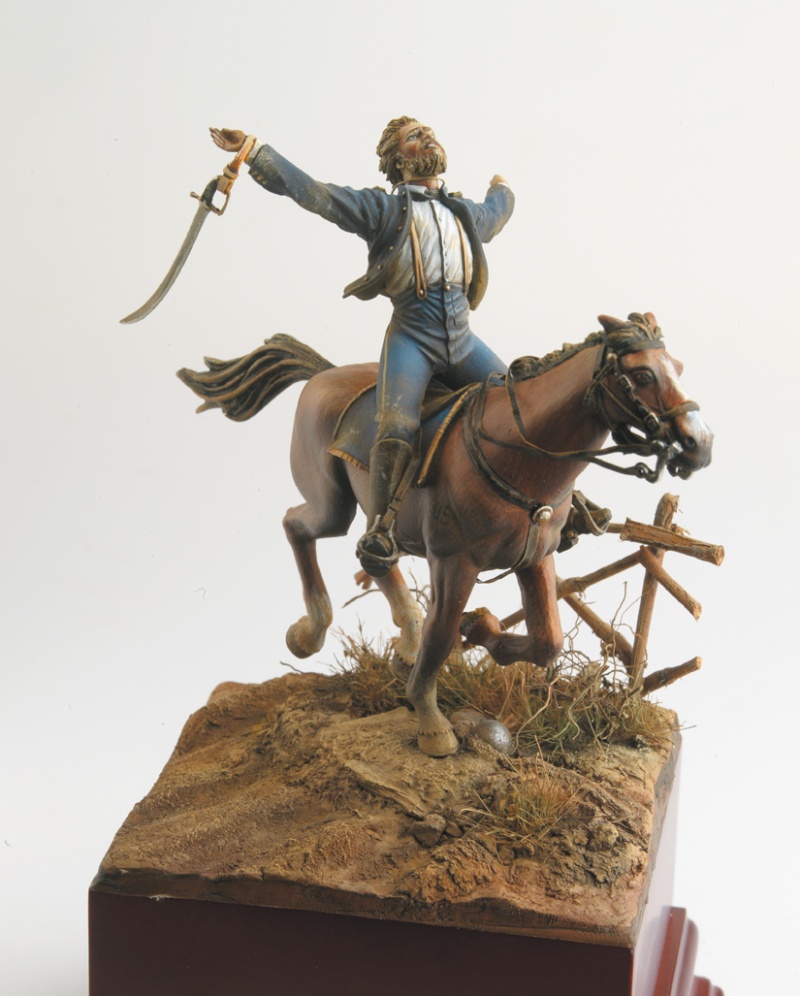 in consequence was directed to advance and hold the ford of Chickamauga Creek at Lee and Gordon's Mills, thus coming into close
in consequence was directed to advance and hold the ford of Chickamauga Creek at Lee and Gordon's Mills, thus coming into closebleak house longstreets hq
 communication with the balance of our forces. I moved into this position rapidly, being compelled, though, first to drive back the enemy's cavalry skirmishers, who, having crossed to the west side of the creek, annoyed the right flank of my column a good deal while en route.Below is one of my first conversions, under the light of the macro image he it looks imperfect but to the naked eye good. I'd do this different, first of all I'd cut the thighs and make them longer. This was a Crescent figure and was well done, it was a cowboy.
communication with the balance of our forces. I moved into this position rapidly, being compelled, though, first to drive back the enemy's cavalry skirmishers, who, having crossed to the west side of the creek, annoyed the right flank of my column a good deal while en route.Below is one of my first conversions, under the light of the macro image he it looks imperfect but to the naked eye good. I'd do this different, first of all I'd cut the thighs and make them longer. This was a Crescent figure and was well done, it was a cowboy. 
Upon arrival at Lee and Gordon's Mills I found the ford over Chickamauga Creek temporarily uncovered, through the hurried movement of Wood to the assistance of Davis's division.
 The enemy was already present in small force, with the evident intention of taking permanent possession, but my troops at once actively engaged him and recovered the ford with some slight losses. Scarcely had this been done when I was directed to assist Crittenden.
The enemy was already present in small force, with the evident intention of taking permanent possession, but my troops at once actively engaged him and recovered the ford with some slight losses. Scarcely had this been done when I was directed to assist Crittenden. Leaving Lytle's brigade at the ford, I proceeded with Bradley's and Laiboldt's to help Crittenden, whose main line was formed to the east of the Chattanooga and Lafayette road,
Leaving Lytle's brigade at the ford, I proceeded with Bradley's and Laiboldt's to help Crittenden, whose main line was formed to the east of the Chattanooga and Lafayette road, its right trending toward a point on Chickamauga Creek about a mile and a half north of Lee and Gordon's Mills.
its right trending toward a point on Chickamauga Creek about a mile and a half north of Lee and Gordon's Mills.  By the time I had joined Crittenden with my two brigades, Davis had been worsted in an attack Rosecrans had ordered him to
By the time I had joined Crittenden with my two brigades, Davis had been worsted in an attack Rosecrans had ordered him to 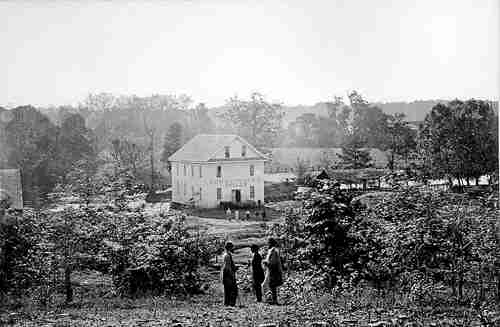 make on the left of that portion of the enemy's line which was located along the west bank of the
make on the left of that portion of the enemy's line which was located along the west bank of the  Chickamauga, the repulse being so severe that one of Davis's batteries had to be abandoned.
Chickamauga, the repulse being so severe that one of Davis's batteries had to be abandoned. Bradley's brigade arrived on the ground first and was hastily formed and thrown into the fight, which up to this moment had been very doubtful, fortune inclining first to one side, then to the other.
Bradley's brigade arrived on the ground first and was hastily formed and thrown into the fight, which up to this moment had been very doubtful, fortune inclining first to one side, then to the other. Bradley's brigade went in with steadiness, and charging across an open corn-field that lay in front of the Lafayette road, recovered Davis's guns and forced the enemy to retire. Meanwhile Laiboldt's brigade had
Bradley's brigade went in with steadiness, and charging across an open corn-field that lay in front of the Lafayette road, recovered Davis's guns and forced the enemy to retire. Meanwhile Laiboldt's brigade had 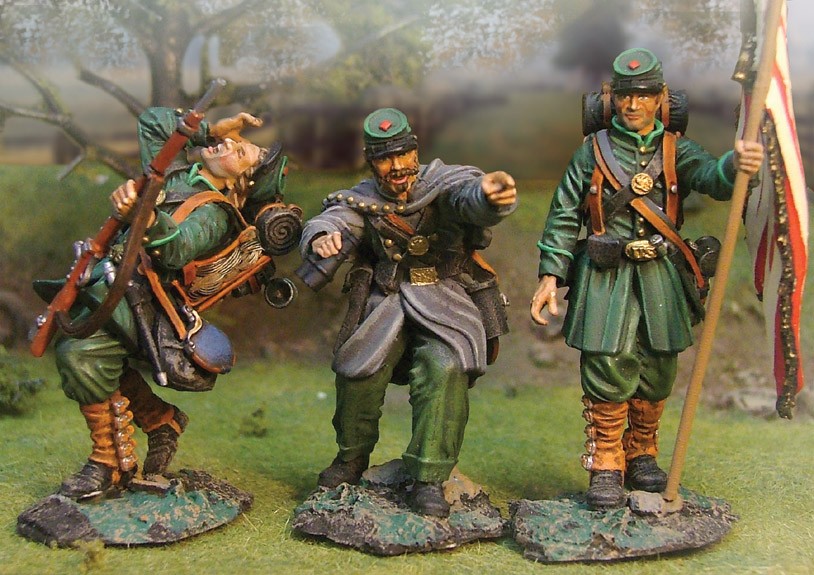 come on the scene, and forming it on Bradley's right, I found myself at the end of the contest holding the ground which was Davis's original position. It was an ugly fight and my loss was heavy, including Bradley wounded. The temporary success was cheering, and when Lytle's brigade joined me a little later I suggested to Crittenden
come on the scene, and forming it on Bradley's right, I found myself at the end of the contest holding the ground which was Davis's original position. It was an ugly fight and my loss was heavy, including Bradley wounded. The temporary success was cheering, and when Lytle's brigade joined me a little later I suggested to Crittenden that we attack, but investigation showed that his troops, having been engaged all day, were not in condition, so the suggestion could not be carried out.
that we attack, but investigation showed that his troops, having been engaged all day, were not in condition, so the suggestion could not be carried out.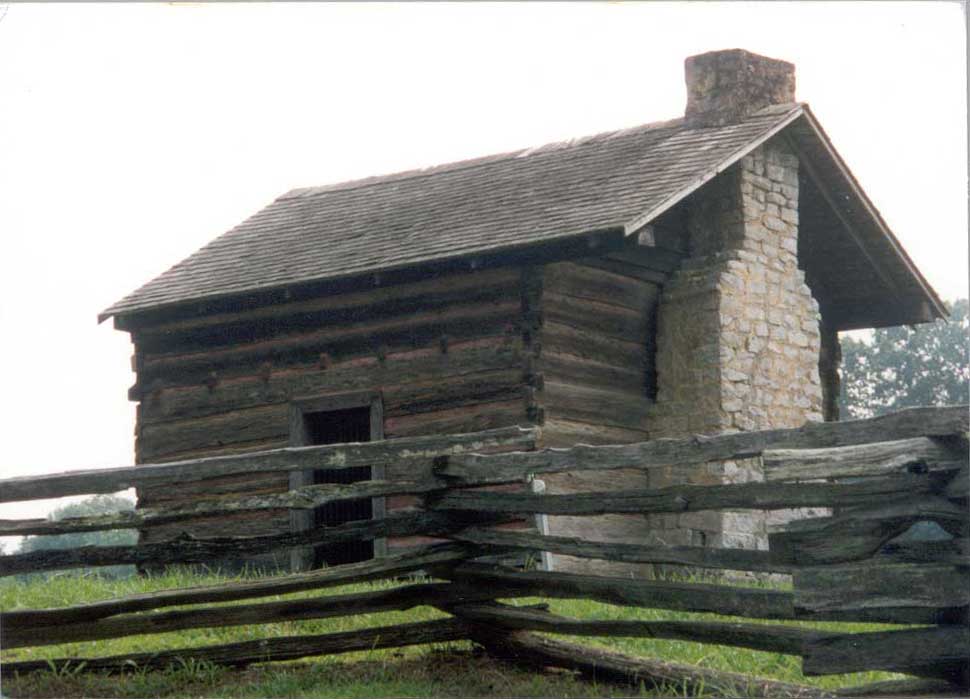
The events of the day had indicated that Bragg's main object was to turn Rosecrans's left; it was therefore still deemed necessary that the army should continue its flank movement to the left, so orders came to draw my troops in toward
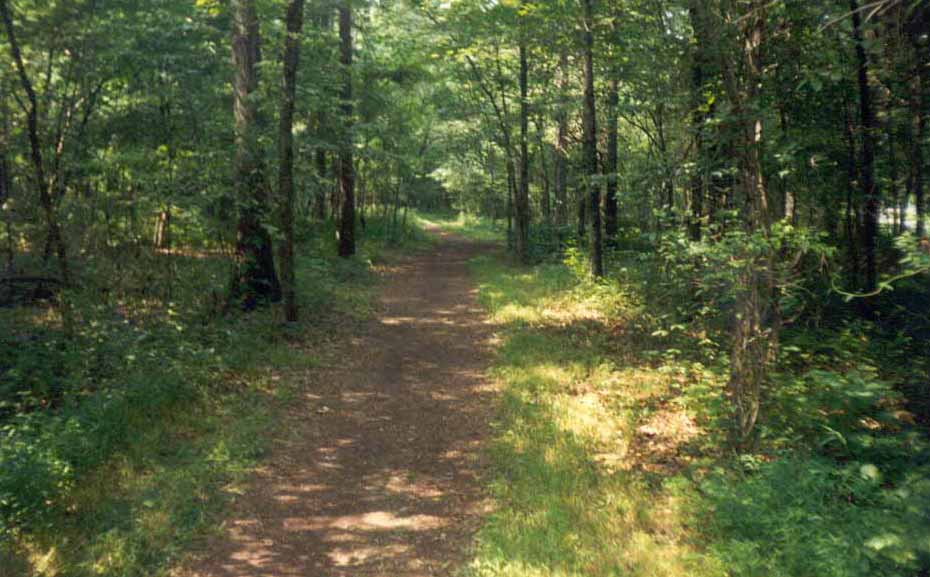 By strengthening the skirmish line and shifting my brigades in succession from right to left until the point designated was reached, I was able to effect the withdrawal without much difficulty, calling in my skirmish line after the main force had retired.
By strengthening the skirmish line and shifting my brigades in succession from right to left until the point designated was reached, I was able to effect the withdrawal without much difficulty, calling in my skirmish line after the main force had retired.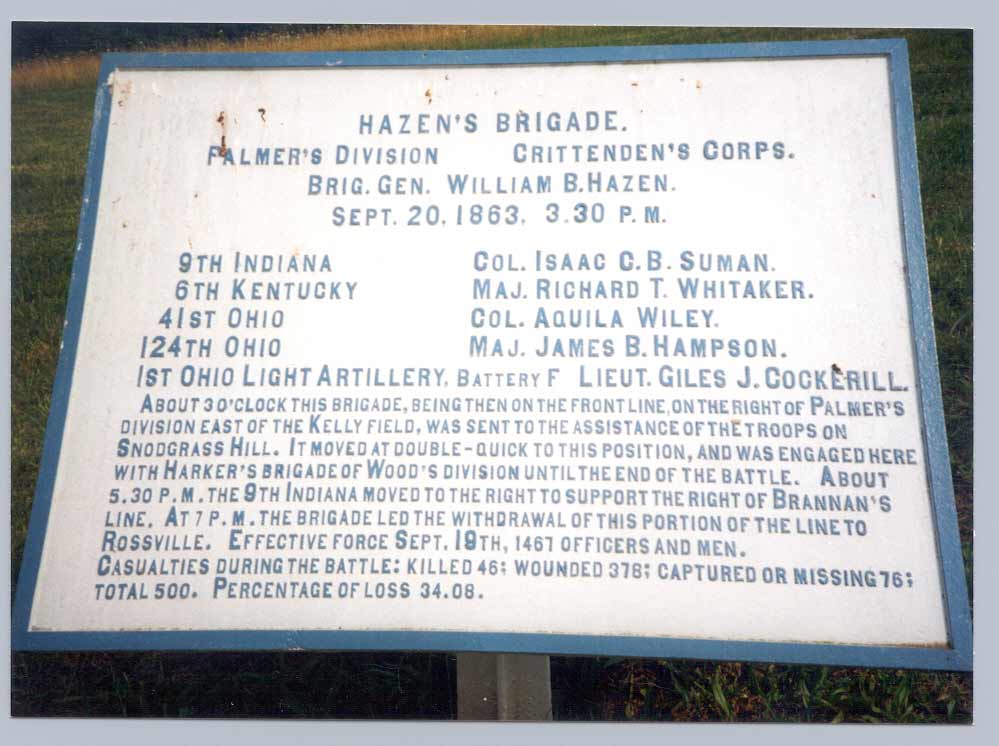
My command having settled down for the night in this new line I rode to army headquarters, to learn if
Q~~60_12.JPG) possible the expectations for the morrow and hear the result of the battle in 's front. Nearly all the superior
possible the expectations for the morrow and hear the result of the battle in 's front. Nearly all the superior  officers of the army were at headquarters, and it struck me that much depression prevailed, notwithstanding the fact that the enemy's attempts during the day to turn our left flank and also envelop
officers of the army were at headquarters, and it struck me that much depression prevailed, notwithstanding the fact that the enemy's attempts during the day to turn our left flank and also envelop 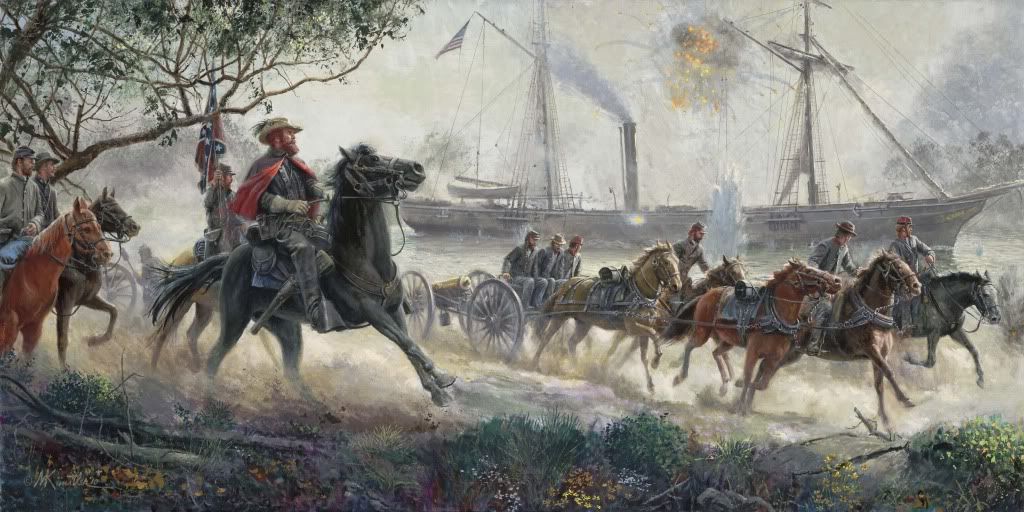 our right had been unsuccessful. It was now positively known, through prisoners and otherwise, that Bragg had been reinforced to such an extent as to make him materially outnumber us, consequently there was much apprehension for the future.
our right had been unsuccessful. It was now positively known, through prisoners and otherwise, that Bragg had been reinforced to such an extent as to make him materially outnumber us, consequently there was much apprehension for the future.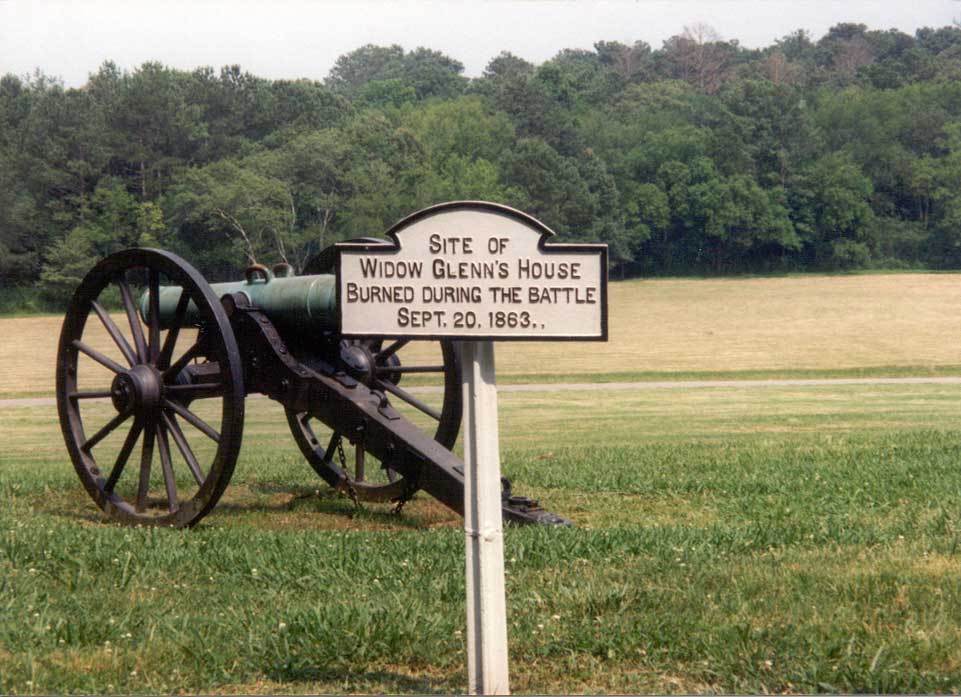
The necessity of protecting our left was most apparent, and the next day the drifting in that direction was to be continued. This movement in the presence of the enemy, who at all points was actively seeking an opportunity
 to penetrate our line and interpose a column between its right and left, was most dangerous. But the necessity for shifting the army to the left was
to penetrate our line and interpose a column between its right and left, was most dangerous. But the necessity for shifting the army to the left was  obvious, hence only the method by which it was undertaken is open to
obvious, hence only the method by which it was undertaken is open to  question. The move was made by the flank in the face of an exultant foe superior in numbers, and was a violation of a simple and fundamental military principle. Under such circumstances columns naturally stretch
question. The move was made by the flank in the face of an exultant foe superior in numbers, and was a violation of a simple and fundamental military principle. Under such circumstances columns naturally stretch out into attenuated lines, organizations become separated, and intervals occur, all of which we experienced;
out into attenuated lines, organizations become separated, and intervals occur, all of which we experienced; and had the orders for the movement been construed properly I doubt if it could have been executed without serious danger. Necessity knows no law, however, and when all the circumstances of this battle are fully considered it
and had the orders for the movement been construed properly I doubt if it could have been executed without serious danger. Necessity knows no law, however, and when all the circumstances of this battle are fully considered it is possible that justification may be found for the manoeuvres by which the army was thus drifted to the left. We were in a bad strait unquestionably, and under such conditions possibly the exception had to be applied rather than the rule.
is possible that justification may be found for the manoeuvres by which the army was thus drifted to the left. We were in a bad strait unquestionably, and under such conditions possibly the exception had to be applied rather than the rule.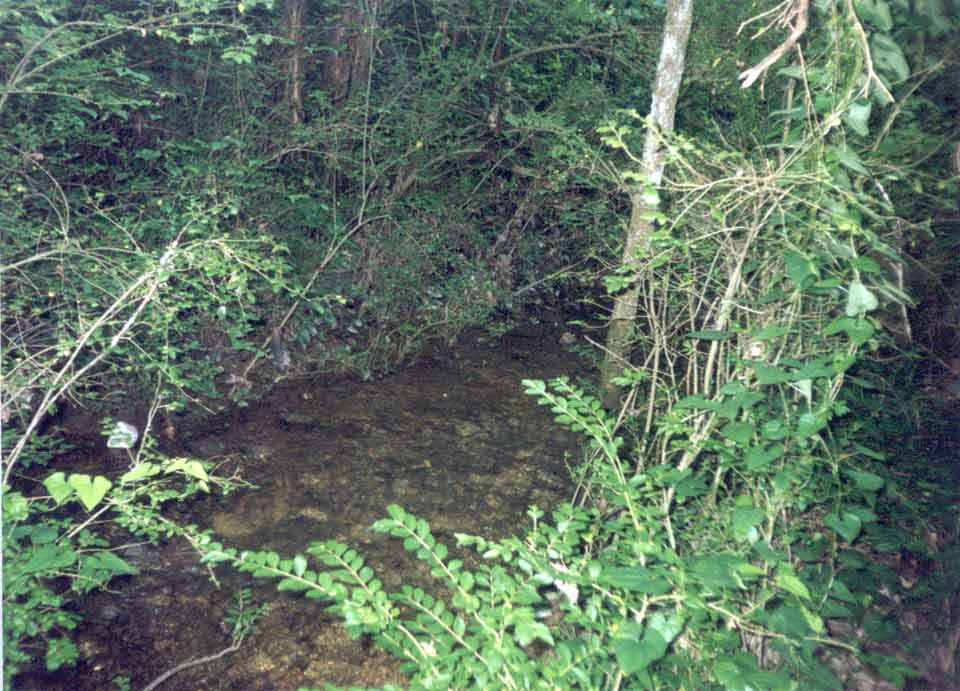
At daylight on the morning of the 20th a dense fog obscured everything; consequently both armies were passive so far as fighting was concerned. Rosecrans took advantage of the inaction to rearrange his right, and I was pulled back closer to the widow Glenn's house to a strong position, where I threw together some rails

New York State Militia
and logs as barricades, but I was disconnected from the troops on my left by a considerable interval. Here I awaited the approach of the enemy, but he did not disturb me, although about 9 o'clock in the forenoon he had opened on our extreme left with musketry fire and a heavy cannonade.
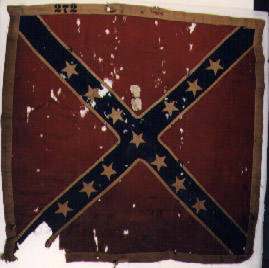 Two hours later it was discovered by McCook that the interval between the main army and me was widening, and he ordered me to send Laiboldt's brigade to occupy a portion of the front that had been covered by Negley's division. Before getting this brigade into place, however, two small brigades of Davis's division
Two hours later it was discovered by McCook that the interval between the main army and me was widening, and he ordered me to send Laiboldt's brigade to occupy a portion of the front that had been covered by Negley's division. Before getting this brigade into place, however, two small brigades of Davis's division occupied the ground, and I directed Laiboldt to form in column of regiments on the crest of a low ridge in rear of Carlin's brigade, so as to prevent Davis's right flank from being turned.
occupied the ground, and I directed Laiboldt to form in column of regiments on the crest of a low ridge in rear of Carlin's brigade, so as to prevent Davis's right flank from being turned.  The enemy was now feeling Davis strongly, and I was about sending for Lytle's and Bradley's brigades when I received an order to move these rapidly to the extreme left of the army to the assistance of General Thomas. I rode hastily back
The enemy was now feeling Davis strongly, and I was about sending for Lytle's and Bradley's brigades when I received an order to move these rapidly to the extreme left of the army to the assistance of General Thomas. I rode hastily back 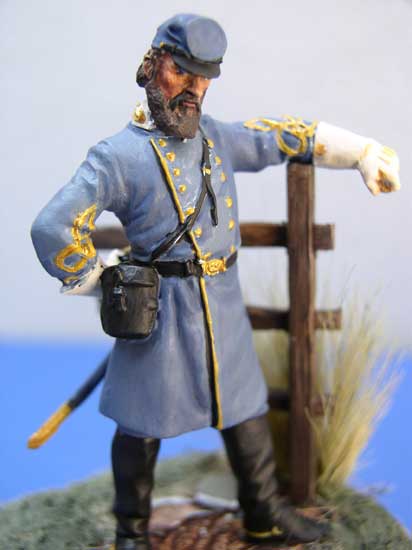 toward their position, but in the meanwhile, they had been notified by direct orders from McCook, and were moving out at a double-quick toward the Lafayette road. By this time the enemy had assaulted Davis furiously in front and flank, and driven him from his line, and as the confused mass came back, McCook ordered
toward their position, but in the meanwhile, they had been notified by direct orders from McCook, and were moving out at a double-quick toward the Lafayette road. By this time the enemy had assaulted Davis furiously in front and flank, and driven him from his line, and as the confused mass came back, McCook ordered  Laiboldt to charge by deploying to the front. This he did through Davis's broken ranks, but failed to check the enemy's heavy lines, and finally Laiboldt's brigade broke also and fell to the rear. My remaining troops, headed by Lytle, were now passing along the rear of the ground where this disaster took place—in column on the road—en route to Thomas, and as the hundreds of fugitives rushed back, McCook directed me to throw in Lytle's and Bradley's brigades. This was hastily done, they being formed to the front under a terrible fire. Scarcely were they aligned when the same horde of Confederates that had overwhelmed Davis and Laiboldt poured in upon them a deadly fire and shivered the two brigades to pieces. We succeeded in rallying them,
Laiboldt to charge by deploying to the front. This he did through Davis's broken ranks, but failed to check the enemy's heavy lines, and finally Laiboldt's brigade broke also and fell to the rear. My remaining troops, headed by Lytle, were now passing along the rear of the ground where this disaster took place—in column on the road—en route to Thomas, and as the hundreds of fugitives rushed back, McCook directed me to throw in Lytle's and Bradley's brigades. This was hastily done, they being formed to the front under a terrible fire. Scarcely were they aligned when the same horde of Confederates that had overwhelmed Davis and Laiboldt poured in upon them a deadly fire and shivered the two brigades to pieces. We succeeded in rallying them, however, and by a counter attack regained the ridge that Laiboldt had been driven from, where we captured the colors of the Twenty-fourth Alabama. We could not hold the ridge, though, and my troops were driven back with heavy loss, including General Lytle killed, past the widow Glenn's house, and till I managed to establish them in line of battle on a range of low hills behind the Dry Valley road.
however, and by a counter attack regained the ridge that Laiboldt had been driven from, where we captured the colors of the Twenty-fourth Alabama. We could not hold the ridge, though, and my troops were driven back with heavy loss, including General Lytle killed, past the widow Glenn's house, and till I managed to establish them in line of battle on a range of low hills behind the Dry Valley road.During these occurrences General Rosecrans passed down the road behind my line, and sent word that he wished to see me, but affairs were too critical to admit of my going to him at once, and he rode on to Chattanooga. It is to be regretted that he did not wait till I could join him, for the delay would have permitted him to see that matters were not in quite such bad shape as he supposed; still, there is no disguising the fact that at this juncture his army was badly crippled.
Shortly after my division had rallied on the low hills already described, I discovered that the enemy, instead of attacking me in front, was wedging in between my division and the balance of the army; in short, endeavoring to cut me off from Chattanooga. This necessitated another retrograde movement, which brought me back to the southern face of Missionary Ridge, where I was joined by Carlin's brigade of Davis's division. Still thinking I could join General Thomas, I rode some distance to the left of my line to look for a way out, but found that the enemy had intervened so far as to isolate me effectually. I then determined to march directly to Rossville,
 and from there effect a junction with Thomas by the Lafayette road. I reached Rossville about o'clock in the afternoon, bringing with me eight guns, forty-six caissons, and a long ammunition train, the latter having been found in a state of confusion behind the widow Glenn's when I was being driven back behind the Dry Valley road.
and from there effect a junction with Thomas by the Lafayette road. I reached Rossville about o'clock in the afternoon, bringing with me eight guns, forty-six caissons, and a long ammunition train, the latter having been found in a state of confusion behind the widow Glenn's when I was being driven back behind the Dry Valley road.
The head of my column passed through Rossville, appearing upon Thomas's left about 6 o'clock in the evening, penetrated without any opposition the right of the enemy's line, and captured several of his field-
 hospitals. As soon as I got on the field I informed Thomas of the presence of my command, and asked for
hospitals. As soon as I got on the field I informed Thomas of the presence of my command, and asked for orders. He replied that his lines were disorganized, and that it would be futile to attack; that all I could do was to hold on, and aid in covering his withdrawal to Rossville.
orders. He replied that his lines were disorganized, and that it would be futile to attack; that all I could do was to hold on, and aid in covering his withdrawal to Rossville.


No comments:
Post a Comment